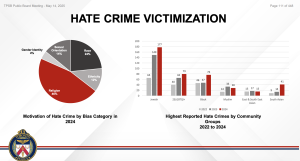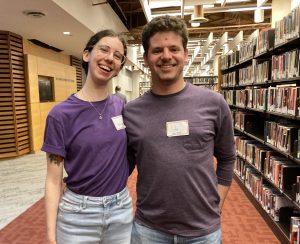Jeffrey Bernstein has helped communities around the globe – the 27-year-old political science grad has been everywhere from Uruguay to South Sudan and Israel. Now he’s ready to bring his skills to help his own community in Canada.
Bernstein is the co-founder of synapsABILITY, an organization that hopes to provide a digital space for Canadians with disabilities and their families. “We’re trying to build an online social platform for the support networks that care for people with developmental and physical disabilities in Canada,” he said.
The project is a very personal one for Bernstein, whose autistic brother, Alan, was the inspiration behind the organization. “He’s an incredible guy… He does a lot in the community. He’s very, very, very involved with the Jewish community, and he’s sort of found a home for himself over the years there, in various synagogues and organizations.”
The idea behind synapsABILITY, which is still in its early stages, is to provide a new tool for people with disabilities and their networks (families, friends, social workers, educators, doctors, employers, etc.) that allows them to connect with each other and learn from their experiences.
“The population in Canada with disabilities and the people who support them is a big, growing and powerful network that hasn’t necessarily found its voice in the way that many advocates would like it to,” the Toronto native said. “But this is something that we’re hoping to eventually change.
“I’ve been trying to find a way back to my community in a sense,” Bernstein added, “and find something that I could connect with here, locally. Something that would be meaningful work and hits close to home.”
He said a lot of people ask him why he’s become a social entrepreneur when his background is in politics and public affairs. But according to Bernstein, the two career paths aren’t so far apart: both allow him to work with social justice, which is something he’s always been passionate about.
Bernstein has been volunteering since he was a kid. He was heavily involved with the Jewish youth groups Kadima and United Synagogue Youth, where he was able to get a first taste of helping out people in need. “The social action component was kind of that big driver,” he said.
He enrolled at the University of Toronto for his undergraduate degree and chose to spend his third year studying at the Hebrew University of Jerusalem. Bernstein focused on Middle Eastern politics during his time there and said it was his first introduction to independent research.
“That was definitely one of my defining moments for growth, I’d say. Obviously, living in a different country, as familiar as Israel might be to Jews, it’s still very different,” he said. “But going as a 20-year-old, there’s a lot that you sort of absorb and learn.”
He said he came back to Toronto with a newfound energy. After wrapping up his undergrad degree at U of T, Bernstein worked at a think-tank in Washington, D.C., for six months and volunteered with the Barack Obama campaign.
“Just being in D.C. as a political scientist – it’s the Mecca of this universe for anyone who wants to study that, who wants to work in international policy, international affairs,” he said. “It was amazing. I was very lucky to have that break.”
While he waited to hear back from master’s programs, Bernstein did some travelling. He returned to Israel and stayed there for three months, but this time he volunteered at an organization called Peace Players International. He described it as a project that uses “basketball as a model for bridging the divides between… parties in conflict.”
Bernstein added that he got to see a different side of the country that he didn’t get to see while on his Birthright trip or even during his year abroad at Hebrew U.
He returned from his trip and started pursuing his master’s degree at the Norman Paterson School of International Affairs at Carleton University in Ottawa. During that time, he also landed a job working as a human rights adviser to Canadian Senator Roméo Dallaire. There, he was responsible for managing the senator’s international relationships and doing things like writing speeches and op-eds.
It’s safe to say Bernstein has done some exciting things over the last few years. But one of his most thrilling experiences happened just a few months ago when he landed a gig at a startup organization that does consultancy work in international policy and research. It might not sound like an interesting job, but it’s the one that led him on a hunt for counterfeit medicine in South Sudan and Myanmar.
“My boss had spent a lot of time in [unusual] places,” he said, citing Somalia, Yemen and Nigeria as examples.
“He would always notice that in market places there would be medicine that either looked suspicious or was unlabelled, or it was sort of lumped in.”
Over the summer, Bernstein spent a month in South Sudan and a month in Myanmar investigating counterfeit medicine issues. He said being in South Sudan was an eye-opening experience. “I’ve travelled a lot, I’ve been to a lot of places… But [South Sudan is] unlike any country I’ve ever seen or you could imagine. It’s almost like being in the beginning of time, in a sense. There’s only a few kilometres of paved roads there. There’s very, very little infrastructure. Brick and mortar buildings… there’s a few, but it’s not sort of the norm.”
All of his experiences have helped him become a social entrepreneur. Bernstein said any young person can launch a company nowadays. It’s about having an idea and surrounding yourself with motivated people.
You don’t have to drop everything you’re doing in order to have an entrepreneurial experience, he added. Sometimes it’s just a matter of learning or volunteering in an area you’re passionate about. He said that young generations are now shaping many fields, including marketing, technology and advertising.
“There’s incredible change that’s happening in that world, being driven by people who are not any older than us,” he said. “In fact, many are much younger.”
To connect with Bernstein about opportunities with synapsABILITY, or to learn more about his Generation Y-mentorship project, send him a tweet at @JeffMBernstein.






